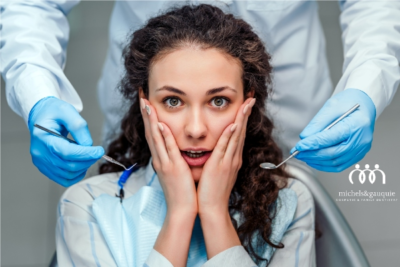Experiencing fear, anxiety, or stress in a dental setting is a common problem that is often attributed to certain triggers such as needles, drills, or visiting a dentist in general. When an individual feels severely anxious about a dental appointment, it might result in irrational fear and complete avoidance of going to the dentist, which can be classified as dental phobia. Dental phobia can result in delaying or avoiding dental treatment.
 HOW TO MANAGE DENTAL ANXIETY OR PHOBIA?
HOW TO MANAGE DENTAL ANXIETY OR PHOBIA?
There are several coping techniques through which dental anxiety can be managed.
Talk about it!
If you have experienced any level of dental anxiety in the past, inform your dentist. Discussing the individual triggers of anxiety can help the dentist work with you to tailor a treatment plan. Don’t be afraid to ask questions. A major amount of fear stems from not knowing what is going to happen at your appointment. Having an understanding of what you are looking forward to helps alleviate any fears of the unknown.
SEDATION OPTIONS
In case of severe dental fear or phobia, your dentist might want to manage it with relative analgesia (nitrous oxide or Laughing Gas), anxiety-relieving medication, conscious sedation.
Nitrous Oxide Sedation (Laughing Gas)
Nitrous oxide (Laughing Gas) provides relative analgesia that can help people relax during dental treatment. It will make you feel relaxed but you will still be conscious and awake.
Conscious Sedation
Conscious sedation or IV sedation involves receiving medication through a drip placed into a vein of the arm or hand. It helps patients relax and they may drift off into a light sleep, but they are still able to respond to verbal prompts.
Anxiety Relieving Medication
Oral anxiety-relieving medications are sometimes prescribed by healthcare professionals to help anxious patients relax. It has a short-acting period and a small, single-dose is usually taken one hour before the dental appointment



